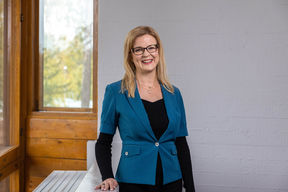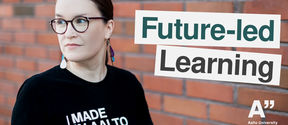Five tips for remote working
Also, check out the three tips below for working efficiently in virtual teams.

At the Department of Industrial Engineering and Management I study the changing nature of work and leadership in virtual work. I am interested in how to lead and organise the shift to hybrid work. I am particularly interested in practices that foster employee well-being and engagement to the organisation.
In one of my research projects, Exponential, we study work efficiency and organising before COVID-19 and thereafter. About twenty multinational and Finnish organisations are participating from the top management to the expert level. We have studied organisational dynamics, management practices, and the effects of virtual work on occupational well-being and on work efficiency.
We have found that the coronavirus year has had a weakening effect on how meaningful people experience their work and on the level of employee engagement with their organisations. It is important to consider how to align people’s focus to the same direction and to work together for a common goal, rather than focusing exclusively on their own personal goals.
In the summer, we won the best paper award at the Academy of Management conference. In a longitudinal diary study, we asked the members of 14 teams in different companies to write about their experiences during the pandemic. We noticed that some were concerned about how the team would cope and tried to hold the team together and to breathe some community spirit into it. If a team seemed to be doing particularly well, it was sometimes obtained at the expense of the individuals who made great efforts to promote the well-being of the team. This led to considerable exhaustion. Meanwhile, other individuals focused on their own coping and survival. According to our survey data, there was nothing wrong with their well-being. They turned their backs on the team and no longer participated in shared activities. If many individuals in a team were focusing primarily on their own well-being instead of the team well-being, there is a danger that the team will break apart.
The research offers a better understanding of how coping with mutual stressful demands is the sum of the individual and the working community. Both need to fare well.
Before COVID-19 we observed 50 people at their workplaces for altogether a hundred workdays. Participants in the study had heart rate variability monitors and we followed them everywhere, including various meeting situations. According to the research, it was clear that people suffered significantly more from feelings of exhaustion and stress at virtual meetings. When we measured the cognitive performance of people after the meetings, we found that the so-called “Zoom fatigue” lowered their cognitive performance by 21 percent. Meeting face-to-face did not cause fatigue - it actually energised people.
I studied work psychology and leadership as my long minor and already in my second year as an undergraduate, I applied for a research assistant's position in a research project of Professor Eila Järvenpää. Professor Matti Vartiainen picked me out from there to be a research assistant for his projects.
When I graduated, I went to work as an HR manager in the company CRF Health, and I set up HR activities there. When I left that job, we had opened five international offices with a total of 250 employees. That is one of the success stories for alumni of the Department of Industrial Engineering and Management.
I contacted Professor Vartiainen again and told him that I wanted to start working on a doctoral dissertation. In addition to Aalto, I have worked a total of four years at Stanford University in two phases. I first went there in 2008, I defended my doctoral dissertation in 2010, had three children, and we returned from Stanford in the summer of 2015. Then I started work at the School of Business, and in February 2016 I was chosen to lead the IDBM (International Design Business Management) master's programme. I headed the programme for five years as a Professor of Practice.
However, throughout those five years, I continued my research work as if I had been a tenure track professor. I managed to accumulate enough research and teaching merits to apply for an assistant professorship and was immediately accepted at the second level. What is exciting about this is that my professorship opened just when Järvenpää retired. I even have her former office.
Stanford without a doubt! When I went there in 2008, I was among the first Aalto students to go there. I started to prepare my departure already in 2006 and to clear a path in that direction. Online I found an interesting professor in my field, Pamela Hinds, and it took some time for me to get her attention. One local person knew me and told Hinds that this potential Ph.D. student would be worth speaking to. Hinds invited me to Stanford on June 5th, 2007. The date happens to be my birthday.
Hinds and I have cooperated now for 13 years, and the cooperation continues. She is my most important mentor, friend, and research partner. She and her mother have been in Finland at our summer cottage and we have gone through many of the joys and sorrows of life together.
Unyielding perseverance! A researcher needs to love the excruciatingly long journey from launching a study all the way up to the point when the results have been published in a top-tier journal. The satisfaction cannot come from a publication alone because the publication process often involves many rejections and new attempts.
Getting to turn the research of organizational design and leadership into Finland's leading research unit.

Also, check out the three tips below for working efficiently in virtual teams.

Leading creativity can be paradoxical because it often includes destruction, uncertainty, and conflicts, says professor of practice Niina Nurmi.

Professor of Practice Niina Nurmi knows how new things get created. What you need is a team consisting of experts from different fields that feels secure.

The Future-led Learning podcast offers a platform for university educators to reflect their ideas about teaching and learning.



